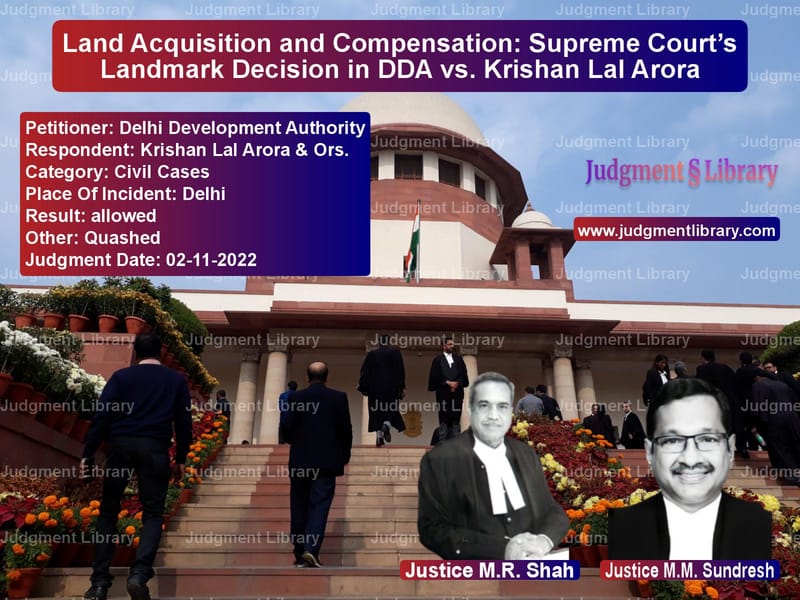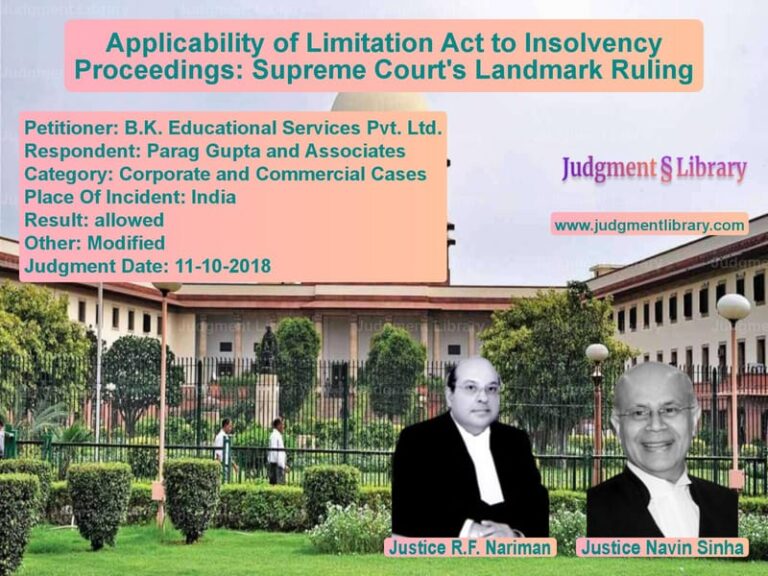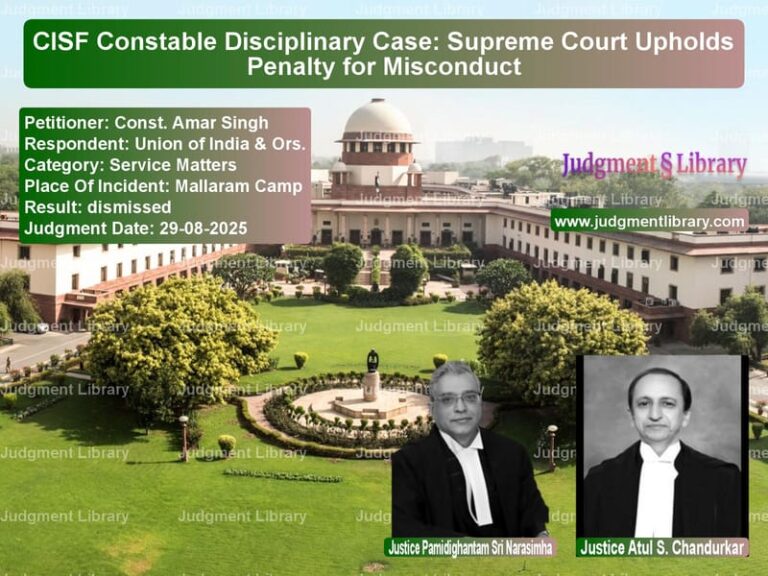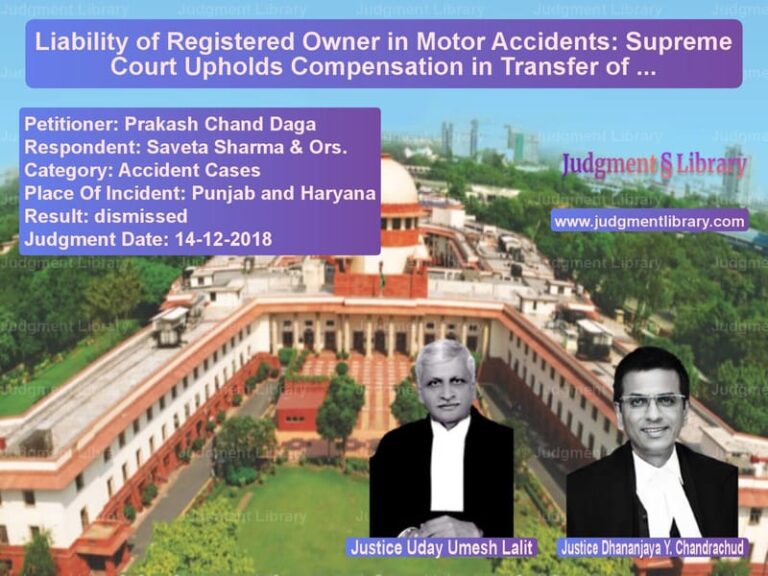Land Acquisition and Compensation: Supreme Court’s Landmark Decision in DDA vs. Krishan Lal Arora
The Supreme Court of India recently delivered a significant ruling in the case of Delhi Development Authority (DDA) v. Krishan Lal Arora & Ors., which addressed the interpretation of Section 24(2) of the Right to Fair Compensation and Transparency in Land Acquisition, Rehabilitation and Resettlement Act, 2013 (hereinafter referred to as “Act, 2013”). The core issue in this case was whether the land acquisition proceedings initiated under the Land Acquisition Act, 1894, had lapsed due to non-payment of compensation.
Background of the Case
The dispute arose when the High Court of Delhi ruled in favor of the respondents, declaring that the acquisition of the disputed land had lapsed under Section 24(2) of the Act, 2013. The High Court’s decision was based on the premise that, while possession of the land had been taken, compensation had not been paid to the landowners.
Read also: https://judgmentlibrary.com/supreme-court-dismisses-review-petition-in-mysore-urban-division-case/
The Delhi Development Authority (DDA) challenged this decision, arguing that the High Court’s interpretation was inconsistent with the Supreme Court’s Constitution Bench ruling in Indore Development Authority v. Manoharlal & Ors. (2020) 8 SCC 129, which provided a definitive interpretation of Section 24(2).
Petitioner’s Arguments
The DDA, as the appellant, presented the following key arguments:
- The possession of the land in question was taken over on 02.09.2006 by the Land Acquisition Collector.
- The High Court incorrectly ruled that the acquisition lapsed solely due to non-payment of compensation.
- The Supreme Court’s Constitution Bench in Indore Development Authority had clarified that acquisition does not lapse merely due to non-payment of compensation.
- The phrase “paid” in Section 24(2) does not necessarily mean direct payment to landowners; it includes tendering of compensation.
- The acquisition process should be viewed as valid, considering that possession was lawfully taken and the award was passed.
Respondent’s Arguments
The respondents (landowners) contended:
- Despite the possession of the land being taken, they had not received the compensation as mandated under the Act, 2013.
- The acquisition proceedings should be considered lapsed under Section 24(2) since compensation was not deposited or paid.
- The Supreme Court’s earlier ruling in Pune Municipal Corporation & Anr. v. Harakchand Misirimal Solanki & Ors. (2014) 3 SCC 183 supported their position.
- The government cannot deprive landowners of their property without ensuring fair compensation.
Supreme Court’s Observations
The Supreme Court carefully examined the legal precedents and legislative intent behind Section 24(2) of the Act, 2013. The Court reiterated the principles set forth in the Constitution Bench ruling in Indore Development Authority:
- For acquisition to lapse under Section 24(2), both possession must not have been taken and compensation must not have been paid.
- If either possession has been taken or compensation has been paid, the acquisition remains valid.
- Non-deposit of compensation in court does not automatically mean the acquisition lapses.
- Landowners who refused compensation or sought higher compensation cannot claim the acquisition has lapsed.
- Once land is vested with the State upon taking possession, it cannot be reverted back under Section 24(2).
Supreme Court’s Decision
The Supreme Court ruled in favor of the Delhi Development Authority and held that:
- The High Court’s reliance on non-payment of compensation as the sole ground for declaring the acquisition lapsed was incorrect.
- Possession of the land had already been taken, thereby validating the acquisition.
- The ruling in Pune Municipal Corporation was overruled by the Constitution Bench in Indore Development Authority, and the High Court’s judgment was contrary to the latter’s interpretation.
- The respondents’ claim of lapse was legally untenable as per the Supreme Court’s settled law.
The Court, therefore, set aside the High Court’s judgment and dismissed the respondents’ writ petition.
Key Takeaways from the Judgment
This ruling provides important clarity on land acquisition law:
- Interpretation of Section 24(2): The Court reaffirmed that land acquisition does not lapse if either possession has been taken or compensation has been paid.
- Finality of Possession: Once possession is taken for public purposes, the land vests in the State and cannot be reclaimed due to procedural issues in compensation payment.
- Impact on Pending Cases: The judgment provides a clear precedent, preventing landowners from exploiting legal loopholes to challenge acquisitions that have been lawfully executed.
- Clarification on Compensation: The Court distinguished between non-payment and refusal to accept compensation, clarifying that non-deposit in court does not invalidate the acquisition.
Conclusion
The Supreme Court’s ruling in Delhi Development Authority v. Krishan Lal Arora & Ors. upholds the principle that valid land acquisitions cannot be undone solely due to non-payment of compensation. By reinforcing the interpretation set forth in Indore Development Authority, the Court has ensured that public development projects are not disrupted by misinterpretation of land acquisition laws. This judgment is a landmark precedent in protecting government acquisitions while ensuring fair compensation for landowners.
Petitioner Name: Delhi Development Authority.Respondent Name: Krishan Lal Arora & Ors..Judgment By: Justice M.R. Shah, Justice M.M. Sundresh.Place Of Incident: Delhi.Judgment Date: 02-11-2022.
Don’t miss out on the full details! Download the complete judgment in PDF format below and gain valuable insights instantly!
Download Judgment: delhi-development-au-vs-krishan-lal-arora-&-supreme-court-of-india-judgment-dated-02-11-2022.pdf
Directly Download Judgment: Directly download this Judgment
See all petitions in Property Disputes
See all petitions in Damages and Compensation
See all petitions in Specific Performance
See all petitions in Landlord-Tenant Disputes
See all petitions in Judgment by Mukeshkumar Rasikbhai Shah
See all petitions in Judgment by M.M. Sundresh
See all petitions in allowed
See all petitions in Quashed
See all petitions in supreme court of India judgments November 2022
See all petitions in 2022 judgments
See all posts in Civil Cases Category
See all allowed petitions in Civil Cases Category
See all Dismissed petitions in Civil Cases Category
See all partially allowed petitions in Civil Cases Category







